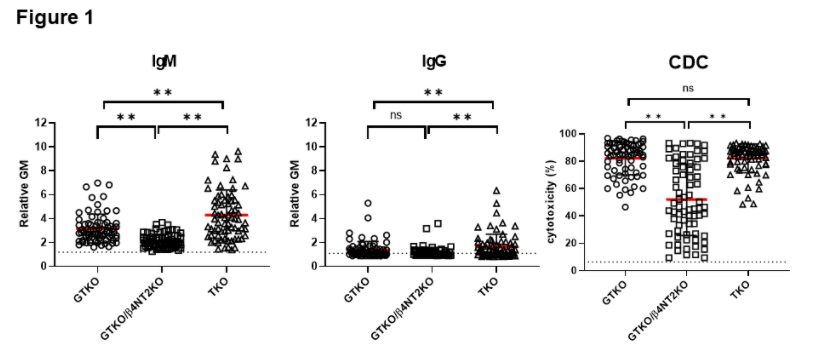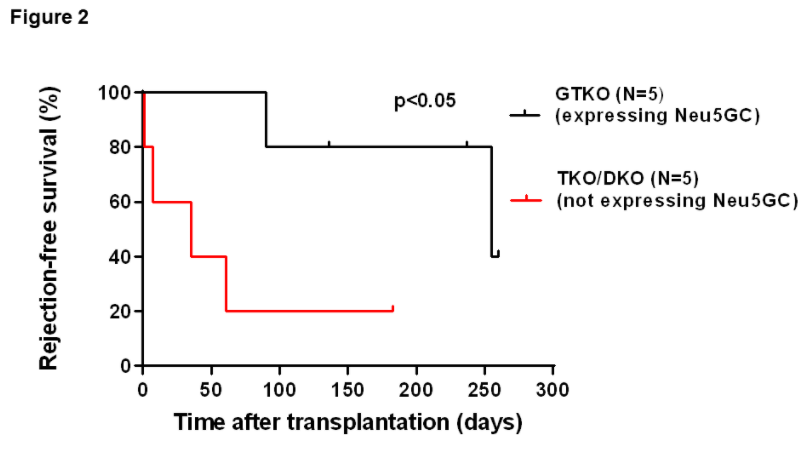
Evidence for GTKO/β4GalNT2KO pigs as the preferred organ-source for old world monkeys as a preclinical model of xenotransplantation instead of triple-knockout pigs
Takayuki Yamamoto1, Hayato Iwase1, Yehuai Cui1, Syed Sikandar Raza1, Abhijit Jagdale1, Jeremy Foote1, David Ayares2, Douglas Anderson1, Devin Eckhoff1, David Cooper1, Hidetaka Hara1.
1Xenotransplantation Program, Department of Surgery, University of Alabama at Birmingham, Birmingham, AL, United States; 2Revivicor, Blacksburg, VA, United States
Purpose: Triple-knockout pigs (TKO, in which expression of the three known pig xenoantigens has been deleted) are likely to be an optimal source of organs for transplantation into human recipients, some of whom do not have natural antibodies against TKO pig cells. However, Old World monkeys, e.g., baboons, have natural antibodies directed to TKO cells, i.e., to a ‘fourth’ xenoantigen that appears when N-glycolylneuraminic acid (Neu5Gc) is deleted. The aim of this study was to evaluate in vitro (i) anti-pig IgM/IgG binding, and (ii) complement-dependent cytotoxicity (CDC) to several kinds of pig peripheral blood mononuclear cells (PBMCs) using baboons sera. In addition, (iii) in vivo we compared the survival in baboons of renal grafts from pigs that either (a) expressed Neu5Gc (GTKO pigs) or (b) did not express Neu5Gc (GTKO/CMAHKO or TKO pigs) and therefore expressed the ‘fourth’ xenoantigen.
Methods: In vitro, we measured (i) anti-pig IgM/IgG binding, and (ii) CDC by flow cytometry to GTKO, GTKO/β4GalNT2KO (that do not express the ‘fourth’ xenoantigen), and TKO pig PBMCs using 72 baboon sera. In vivo, life-supporting renal transplants were carried out in baboons using GTKO (n=6) or CMAHKO (TKO or GTKO/CMAHKO) (n=6) pig kidneys under an anti-CD40mAb-based regimen.
Results: In vitro studies: Mean IgM antibody binding to GTKO/β4GalNT2KO pig PBMCs was significantly lower than to GTKO or TKO pig PBMCs (p<0.01). Mean IgG antibody binding to GTKO/β4GalNT2KO pig PBMCs was significantly lower than to TKO PBMCs (p<0.01). Mean CDC of GTKO/β4GalNT2KO pig PBMCs was significantly lower than of GTKO or TKO pig PBMCs (p<0.01) (Figure1). In vivo studies: One baboon in each group required early euthanasia for acute gastric dilatation, and were excluded from further analysis. GTKO pig kidneys functioned for 90-260 days (median 237 days, mean 196 days), with histopathological features of antibody-mediated rejection (AMR) being seen in only 2 of 5. The rejection-free survival of pig kidneys not expressing Neu5Gc (TKO or GTKO/CMAHKO) was significantly shorter (median 35 days; mean 57 days) (p<0.05) (Figure2). Four of 5 grafts failed from AMR within 1-61 days, and one baboon was euthanized for peripheral artery embolism at 183 days without features of rejection.
Conclusions: Even though considered ideal for clinical xenotransplantation, the presence of natural antibodies to CMAHKO (TKO or GTKO/CMAHKO) pig cells in baboons complicates the survival of CMAHKO pig kidneys in baboons. Based on this vitro data, the use of GTKO/β4GalNT2KO (instead of TKO) pigs would be preferable for pig-to-baboon organ transplantation.

